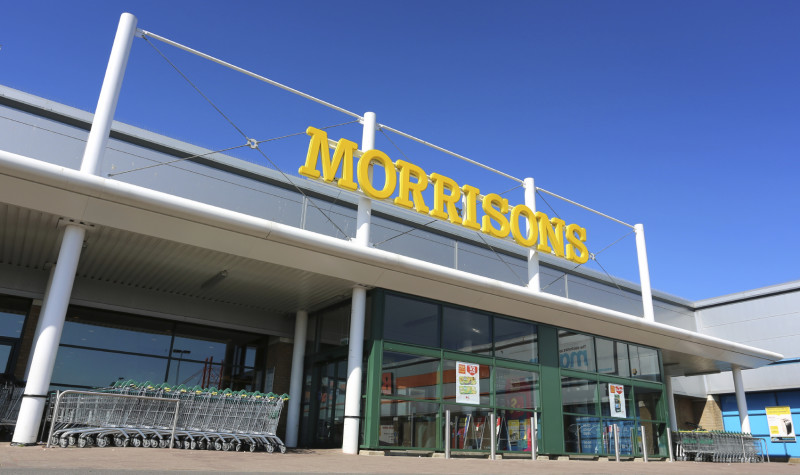Morrison’s and Amazon: Little Red Riding Hood and the Big, Bad Wolf

“Oh Granny, what big ears you’ve got!” said Little Red Riding Hood. And the wolf replied “All the better to hear you with, my dear!” Then she said “Oh Granny, what big teeth you’ve got! And the wolf replied “All the better to eat you with, my dear!”
– From the ancient European fairy tale popularised by the Brothers Grimm in the early 19th Century.
On a dark December day last year, as one of our Trolley Letter correspondents pointed out, Morrison’s (LON:MRW) was demoted from the FTSE-100. But now it’s back. Hearty pats on the back are in order; a little objective analysis might be welcome also.
First of all December (Christmas) trading figures despite food price deflation pleased the markets after a fall in sales in Q3 2015. And then, on 01 March, Morrison’s announced a tie-up with Amazon (NASDAQ:AMZN) to sell their groceries online. The supermarket chain’s shares rose by six percent, though they have eased since then. Morrison’s, it seems, are to become the principal supplier for Amazon’s new Pantry Service portal which already supplies big consumer brands such as Kellogg’s, Colgate and Ariel. Henceforth, shoppers will be able to buy fresh produce, meat, fish and frozen food from Morrison’s on Amazon in the expectation of same-day delivery.
Readers will recall that Morrison’s was slow to enter the online shopping space, allowing big rivals like Tesco and Sainsbury’s to establish a pre-eminent lead here. Two years ago Morrison’s announced a home delivery partnership with Ocado (LON:OCDO) but this seems to have disappointed. When news came through that Ocado had been jilted, its shares tumbled by nearly eight percent to 260 pence. Actually, the relationship with Ocado is officially set to continue with Morrison’s taking space in Ocado’s customer fulfilment centre (warehouse) in Erith, South East London.
The logic of the deal is that Morrison’s, based in Bradford, Yorkshire and still stronger in the north than in the south, will be able to generate sales in affluent parts of the UK where it does not have stores. Morrison’s brings fresh food – it is a food producer as well as a retailer – while Amazon brings a mighty online presence and exceptional logistics.
Sainsbury’s (LON:SBRY) has already responded by raising its offer for Home Retail, owner of Argos, to £1.3 billion. All this in the week that the British Retail Consortium (BRC) predicted massive job losses in the retail sector over the next decade due to the combined impact of greater online competition, the Living Wage and the apprentice levy.
For years the big four UK supermarkets (ASDA, Tesco, Sainsbury’s and Morrison’s) pursued a strategy of just do more of the same – build more, bigger out-of-town megastores and expect the punters to pour in, trollies first. Then they were hit by four game-changing trends. Firstly the upstart German discounters, Lidl and ALDI, arrived with a very powerful high-economy customer service proposition. Second, the digital revolution changed the way people shopped. Third, demographic factors brought about the end of the “weekly shop” (now as rare amongst the young as the Sunday roast lunch) in favour of “just-in-time” shopping. Fourth, people came to realise that promotional strategies like BOGOF (buy one get one free) were a con (and also encouraged food waste). Consumers came to focus on the base-line price and further decided that, as far as choice was concerned, you could have too much of a good thing.
Of the big four, only ASDA has decided to compete with the discounters head-on on price. Eco-shoppers were impressed by its decision to offer heavy discounts on weirdly shaped vegetables – though many people still resist these monsters. Morrison’s decided to retreat from the convenience store sector altogether and to focus on what it does best – providing good-quality food at value prices in its large-surface outlets.
Who gets most out of the deal? Amazon has been itching to enter the UK online grocery market for some time. Morrison’s has been fighting a rear-guard action in an ultra-competitive space, though it should be able to generate additional sales through this new channel. Amazon is likely to be the dominant partner, however, and will be able to dictate prices and margins. This is a big deal for Morrison’s, but, in the scheme of things, a very minor play for Amazon. The danger is that Amazon might squeeze Morrison’s just as the supermarkets have been squeezing our unfortunate dairy farmers. Buyer monopolies are notoriously more dangerous than seller monopolies.
Since the deal was announced Morrison’s shares have eased slightly to around 197 pence today. Although it has slashed dividends in recent years, analysts are now expecting increases in dividends as its prospects improve. Results released on 10 March were encouraging. The company has achieved its aims of stabilising like-for-like sales and reducing costs in 2015. It is now extremely cash-generative. What was recently a SELL now looks like a HOLD. But it is still a relative ingénue living in a rapidly evolving and dangerous world – full of wolves…
Comments (0)